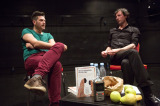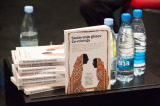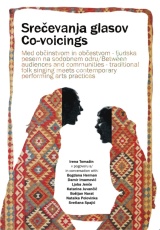Between audiences and communities ‒ traditional folk singing meets contemporary performing arts practices
About
... this book contains the voices of some in the field of many...
Each era meets its predecessor(s). It seeks the roots from which it sprang and looks into the future, wondering what it will grow into. Artistic movements get acquainted with their forerunners; they research and analyze what initiated them, what kind of seeds were planted for them to be able to grow, and at the same time they are always predetermined by their own history. Traditional folk song is thus a contemporary variation, something that is new in every new era, feeding itself from (what was in) the past. It is (a) history coming to life, telling us about ourselves, our ways of living, being, and communicating. It doesn't live in books. Nevertheless, it is important to write and think about it. In different ways. Multiple ways. We have tried to capture at least some in the book that is now before you. (Irena Tomažin)
Irena Tomažin is the author of six projects: Hitchcock’s Metamorphoses (2001) in collaboration with Mitja Reichenberg, Caprice (2005), Caprice Re-lapse (2006), As a Rain Drop into the Mouth of Silence (2008), Out of Discord (2010) in collaboration with Josephine Evrard, and The Taste of Silence Always Resonates (2012). For several years now, she gives vocal workshops focused on raising awareness about and opening up the voice.
She began working in theatre during high school, when she was a member of IHT Collective, led by Tomaž Štrucl. After high school, she began dancing in Studio Intakt and continued her dance education at the Dance Theatre Ljubljana, participating in educational programs such as Laboratorij, Agon, and Emanat and attending numerous workshops in Slovenia and abroad. In 2004, she received a DanceWeb grant to go to Vienna, and in 2007, she was selected to participate in the educational program Atelier by Grotowski Institute (Wroclaw). She is also the 2006 recipient of the Golden Bird Award, awarded annually by the Liberal Academy, for her pieces Caprice and Caprice Re-lapse. Working with voice in the context of contemporary performing practices, concerts, improvised music, and voice-workshops is the main focus of her professional activity.
In collaboration with:
Katarina Juvančič is a cultural anthropologist, ethnologist, cultural sociologist, music publicist, and singer. Common denominator of all her activities is her work with contemporary folk music, specifically lullabies, and contexts in which folk music is performed (folk revivals, festivals), which she has studied in Slovenia and Scotland. She presented her research and findings from Hawaii, California, Orkney and the Shetland Islands (Scotland) to Sarajevo and Ljubljana. Her music reviews are published in Slovenian and foreign music journals. In recent years, she is also establishing herself as a (song-)writer and poet, drawing from the rich and expressive world of female sentiments, building bridges between contemporary trends and archaic folk poetry and sensibility. Her debut Selivke (Migratory Birds, 2012), recorded with guitarist and producer Dejan Lapanja, received very positive reviews in Slovenia and elsewhere in Europe.
Natalka Polovynka is an actress, singer, performer, interpreter of folk songs, and pedagogue. Her devotion to tradition greatly contributed to the visibility and persistence of traditional singing within cultural and artistic circles both in Ukraine and abroad.
In Ukraine, she founded a school of traditional singing called Maisternia Pisni and, together with director Sergei Kovalevič, co-founded an art center with the same name. She is the author of numerous music and theater projects, such as They Are Coming, Homo Ludens, The Well, Irmos, Sobor, Flower-fiancée, The Message of Summer, After Christmas, and Wedding. She invented her own unique methodology of working with voice and led vocal and singing seminars and workshops at Columbia University (USA), University of Wales (UK), and at the International Institute Jerzy Grotowski in Poland. She collaborates with Grotowski Institute on regular bases as well as with the Academy of Guardians (Moscow) and two of Ukraine's national men's choirs - Dudaryk from Lviv and M. Revutskyja from Kiev. She was awarded many times for her work at several international music and theater festivals and is the recipient of the Ukrainian national award Taras Shevchenko for highest artistic achievements. In 2010, she founded Word and Voice art center, based in Lviv.
Since 1993, Svetlana Spajić has been performing and teaching traditional Serbian and Balkan songs, visiting and living in the villages with singers, learning first hand about the oral tradition and their culture. Her main field of interest are ancient, orally transmitted vocal traditions of Serbian and Balkan non-tempered a capella singing and its unique vocal techniques and ornamentation, language, function, and meaning.
She learned from the best village local singers and sang with some of the best traditional singers of the world, such as Hronis Aidonidis, Domna Samiou, Yanka Rupkina, Bokan Stanković. She has also collaborated with artists Marina Abramović, Robert Wilson, Antony Hegarty, William Basinski, Sainkho Namtchylak, Boris Kovač, Stella Chiweshe, Balkan Beat Box... Svetlana Spajić performed and lectured in Concertgebouw (Amsterdam), Wiener Konzerthaus, MoMA (New York), MOCA (Los Angeles), Teatro Real (Madrid), Jad Vashem Institut (Jerusalem), Grotowski Institute (Wroclaw), Warsaw Radio, WOMAD - Radio BBC3 stage, WOMEX 2010... Since 2010, she has been a part of Bob Wilson's visionary opera The Life and Death of Marina Abramović, as a composer, lyricist, and performer. Last year, she started collaboration with ARIA, Academy for Early and Baroque Music from Nantes.
Ljoba Jenče sang and performed Slovenian folk songs all over the world, from Canada to Thailand, from Argentina to the Himalayas, and across Europe. She is passing on the tradition of her people with dignity and respect to earlier generations who survived such great trials of history. Ljoba is a freelance artist since 1988 and she is singing folk songs from all parts of the Slovenian ethnic territory, collecting them around Koroška Region (Inner Carniola) and Banjšice Plateau, as well as doing continuous research of the human voice; the voice that doesn’t live in music sheets, but in the depths of the human soul, in the vastness of man’s thought, flows of emotion, in the warmth and the heart of the world. Passed on from one generation to another, it cannot be captured on paper. It comes to us from the future, wrapped in the kisses of dialects’, their destinies and suffering, and in the happiness of PEOPLE. Ljoba was very honored when she was invited to sing during the visit of His Holiness the Dalai Lama. With the Tibetan monks she published a record Lepote modrosti (The Beauty of Wisdom). She published several other records and books, sang at the United Nations in New York and at the UNESCO in Paris, but most of all, she loves to sing for the children, either at home at the Cerknica Lake or around the world. She is convinced we must take good care of our children and give them love and sensitivity for all the realms, minerals, plants, animals, humans, and the divine.We should do this in our mother tongue, in the standard language. We are obliged to make this contribution, for the longevity of the Slovenian nation and the Earth as a planet – in other words, to make a relevant contribution into the treasure box called humanity.
Bogdana Herman’s work is based on opening up and reviving the faces of folk songs in a contemporary fashion. For over three decades, she remains the voice of contemporary Slovenian folk music. Unlike many of her peers, who went along with the avant-garde artistic movement in the turbulent 1960s, but then withered away in the comfortable realm of a ‘cult’ artist, Bogdana keeps pushing the boundaries and charting new territories in the field of folk music. Ballads she sang with the group Terlep trio, and later as a solo performer and interpreter, became popular with the younger generation of contemporary folk musicians in the new millennium and became an indispensable part of their repertoire. We are used to listen to Bogdana’s supple, crystal voice in her solo interpretations, but in recent years she has collaborated with an incredibly diverse palette of musicians from different genres (using various instruments and sounds): cymbals player Andi Sobočan, accordionist Jure Tori, guitar player Tomaž Pengov, and digital pulses of a computer by Borut Savski. In all these artistic constellations, she is equally convincing, subtle, perceptive, and fresh. Namely, the material of her songs is like a living organism that is always open to transformation or yet another stylistic molt. (By Katarina Juvančič)
Boštjan Narat is a philosopher, musician, songwriter, author, and (theatre) performer. With his band Katalena, founded in 2001, he recorded five studio albums:(Z)godbe, Babje leto, Kmečka ohcet ali tretji prispevek k slovenski blaznosti, Cvik cvak!, and lastly Noč čarovnic (2011). In 2010, he recorded his debut solo-record as a songwriter entitled Strah je odveč. In spring 2012, in collaboration with Matevž Kolenc, Polona Janežič, Jelena Ždrale, and Blaž Celarec, he recorded and published his second solo-record entitled Konec sveta vedno pride nenapovedano. As a songwriter, he also collaborates with a renowned Slovenian singer Neca Falk. As a composer for theatre, he has worked, among others, with Janez Janša, Brane Potočan, Edward Clug, Valentina Turcu, Tatjana Peršuh, Tomaž Štrucl, Jure Novak, and Mare Bulc. He also writes and publishes articles in expert and literary magazines, moderates a cycle of talks Filozofiranje v Varieteju in the Kavarna Union coffee house, and is the author and host of the show Panoptikum on Radio-Television Slovenia. In the end of 2013, he published a collection of essays with the title Partíja.
Damir Imamović is the new voice of Bosnian traditional music known as “sevdah” and one of the most successful musicians of his generation. His efforts to re-establish the artistic status of traditional Bosnian folk music gained him both domestic and international attention and the opportunity to perform all over the world. Next to recording several CDs with his group Trio and Solo, he participated in musical projects with other celebrated fellow musicians like Vlatko Stefanovski, Bojan Zulfikarpašić, Eric Vloeimans, Bachar Khalife, Tamara Obrovac, Jadranka Stojaković, and performed in venues such as Cemal Resit Rey (Istanbul, TR), Pompidou Centre (Paris, FR), Kennedy Centre (Washington DC, US), Kolarac (Belgrade, RS), Concertgebouw (Amsterdam, NL), etc. His research of sevdah music, its traditions and performance, distinguish Imamović as a prominent figure among experts in this ancient Bosnian craft. Building on this heritage, Imamović developed a distinct personal style of both singing and guitar playing. He regularly gives workshops and lectures with his own travelling laboratory of sevdah music: the “SevdahLab” and previous sessions included Sarajevo (Mediacentar), Belgrade (Centre for cultural decontamination), Zagreb (Booksa), Chicago (Loyola University and The Old Town School of Folk music), Amsterdam (De Balie). .
Order
![]()
Free shipping with online order.
Credits
Book editors: Saša Rakef, Irena Tomažin, Barbara Hribar
Translation: Barbara Hribar
Proofreading in Slovenian: Simona Ana Radež
Proofreading in English: Katja Kosi
Series editor: Maja Delak
Graphic design: Mauricio Ferlin
Print: Collegium Graphicum
Support
Publisher: Emanat – Prehodi XS, 2014
Financial support: European Cultural Foundation
Previous events
- , Cankarjev dom, Ljubljana, SI



